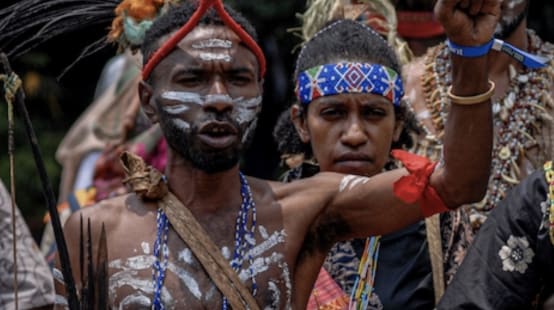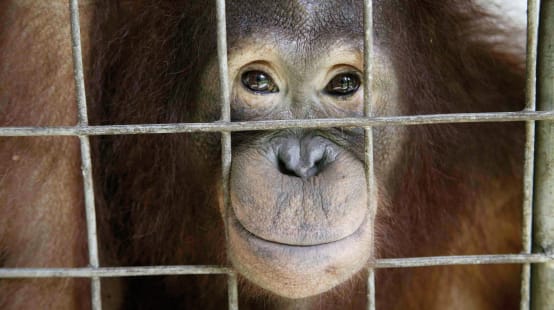Sierra Leone: Land grab for palmoil
 The farmers want to keep and cultivate their land
The farmers want to keep and cultivate their land
The people of Sierra Leone are resisting a new biodiesel project. SOCFIN, a Luxembourg-based company, is planning a palmoil plantation of around 12,000 hectares (around 30,000 acres). The land is being provided to the investors at essentially no cost. Traditional chiefs, politicians and officials are trafficking in the land of the small farmers living there and suppressing the protests of the people. Please support our campaign.
News and updates Call to action“”
UPDATE: Handover of signatures in the Embassy of Sierra Leone Read the news here
“Large tracts of land are now being cleared to make way for palmoil monocultures, and the species-rich natural flora is being destroyed in the process,” says Joseph Rahall, Director of the NGO Green Scenery. “Farming families grow a wide variety of foods there, and are thus able to weather food shortages. Many of the families have now stopped their cultivation work because they fear that multinational companies will occupy their land. Villagers who protested peacefully against the illegal occupation of their land have been arrested. Some are now standing trial. The biofuel policies of the countries of the North are threatening the security of people in countries like ours,” the human-rights activist complains.
More background information...
Please write to the government of Sierra Leone and the Sierra Leonean embassy in Berlin. The SOCFIN plantation project must be stopped immediately and the land returned to the farmers. We will hand over the collected signatures in the near future.
BackgroundRahall’s organization Green Scenery has studied the biofuel project and its impact locally. The results were summarized in a study published in May. Over half of the land, 6,500 hectares, in the Malen Chiefdom of Sierra Leone’s Pujehun District were “leased” – for 50 years – by the subsidiary SOCFIN Agriculture Company S.L. Ltd (SAC).
Traditional chiefs made the land available to the government, which in turn provided it to SAC. But the farmers who live on the land and cultivate it were not involved in the deal and reject it. They are thus losing their livelihoods to unscrupulous plantation owners and receiving alms at best. While the small farmers have petitioned the government, the government’s involvement in the land deal leaves them with no one to protect their rights. Those who protest against it are subject to intimidation.
The government has repeatedly claimed that millions of hectares of suitable agricultural land in Sierra Leone are put to “little or no use”. The agency to promote investment and exports in Sierra Leone (SLIEPA) funded by the World Bank (IFC) is therefore planning to allocate huge tracts of land to major investors over the long term. In Sierra Leone, SOCFIN stands to benefit from extremely low lease rates, generous tax exemptions, minimum wages, weak environmental regulations and widespread corruption – conditions not unlike those of colonial times.
Agribusiness already accounts for over ten percent of the country’s land use. The land deals are not transparent, nor do the involved companies observe Sierra Leone’s already weak regulations. That is the conclusion the Oakland Institute reached in its country study “Understanding Land Investment Deals in Africa: Sierra Leone”.
SAC also is planning more, and has its sights on up to 40,000 hectares in Sierra Leone. The parent company, SOCFIN, already operates 90,000 hectares of oil palm plantations and 50,000 hectares of rubber plantations in several African countries and Indonesia. Another subsidiary of the group, SOCAPALM, has cleared the rainforest in Cameroon and expelled the pygmy peoples from their ancestral land. Journalists who reported critically on these activities have been taken to court in France. SOCFIN belongs to the corporate group of the French industrialist Bolloré, whose close contacts to the French government extend all the way to the Elysee Palace.
Such deals have been known for years as land grabbing. The International Land Coalition network has investigated the worldwide rush for land, documenting land grabs of 200 million hectares for the period from 2000 to 2010. Of the 71 million hectares which were examined more closely, it was determined that more than half was earmarked for the production of biofuels – an area the size of Germany.
For the cultivation of energy crops, the natural, traditional forms of land use of the local population are being replaced by intensive agro-industrial cultures. While small farmers mainly grow food and maintain the fertility of the soil with long fallow periods, the agribusiness operation will produce biofuel for export, using large amounts of fertilizers and pesticides in the process.
Palm oil diesel is highly profitable in Europe. This is due to European Union legislation that stipulates the addition of biodiesel to fossil-based diesel fuels in an effort to fight climate change. Scientists the world over warn however against biofuels, however. Their cultivation and production are associated with enormous environmental damage. Some biofuels have many times the environmental impact of conventional fuels. And because arable land and foodstuffs are being used for the production of biofuels, the UN and other international organizations have called on the industrialized countries to end their biofuel policies. Rising food prices, famines and uprisings threaten otherwise.
Websites of the NGOs Green Scenery and Grain
His Excellency President
Dr. Ernest Bai Koroma
The Embassy of
The Republic of Sierra Leone
H. E. Jongopie Siaka Stevens, Ambassador
Herwarthstrasse 4, 12207 Berlin ,
Germany
Tel: +49 30 7720 5850,
Fax : +49 30 772058529
slberlin@foreignaffairs.gov.sl
Letter of concern on Large-scale Investment in Agriculture in Malen chiefdom, Pujehun District
Dear Mr. President,
I am writing to you with grave concerns about a large-scale land deal set up by the Government of Sierra Leone (GoSL) and Socfin Agriculture Company S.L. Ltd (SAC) in Malen chiefdom, Pujehun District. This deal has put smallholder farmers more insecure than they were before.
In your presidential speech on the occasion of the recent opening of parliament you referred to SAC as one of the successes of your policy to attract foreign investment. It was the Minister of Agriculture, Forestry and Food Security (MAFFS), Dr. Sam Sesay, who signed on behalf of your Government the lease agreement for over 6,500 hectares in Malen chiefdom, Pujehun District and then sub-leased it to Socfin for over 50 years, considering the 21 years extension. We are concerned that the land deal will not benefit the landowners and the land-users, mainly of whom are women who depend on their farming for food and income, and it will not reduce rural poverty and contribute to food security, which your government has made a priority.
Fact-finding mission reports have revealed that the whole arrangement and the procedures suffered from a lack of transparency. Landowners were not given even basic facts about the agreement. Their land was not properly surveyed and mapped. Their livelihoods were not assessed and as a result not adequately compensated. To date, the lease agreement has not been made available to them. The Paramount Chief has been accused of intimidation to forcefully gain the signatures of landowners. Furthermore not all stakeholders were consulted and information was not distributed adequately and in a timely manner. Policy guidelines for investors published by your ministry (MAFFS) and the Sierra Leone Investment and Export Promotion Agency (SLIEPA) were ignored because they are not binding. The SAC land deal misses out on all the best practice principles developed by the United Nations, the World Bank and the United Nations Food and Agriculture Organisation.
The manner in which the land deal was conducted undermines good governance initiatives that your Attitudinal Change campaign is addressing. According to local sources the lease and sublease agreements are not registered, the Environmental Impact Assessment (EIA) requirements have not passed the standards of the Environmental Protection Agency (EPA), yet the company is already engaged in major operations in the country. A legal analysis of the lease agreement has cast into doubt the legality of the document according to Sierra Leonean Law.
The one-off compensation of one million Leones (less than USD 230) for an acre of productive smallholder palm oil plantation for 50 years and the annual lease of USD 12.5 per hectare paid for the land, the generous fiscal advantages and tax incentives and other provisions (water access and use, stabilization clause amongst others) guaranteed by the Government of Sierra Leone to the company raises doubts about what benefits there are for Sierra Leone from such a land deal.
Grievances and recommendation letters of affected landowners seemed to be ignored by stakeholders; instead arrests and intimidation of landowners followed their peaceful approaches. Fifteen landowners are already facing the court and very recently, tension between the company and their workers have led to harsh police intervention and more arrests. Landowners are disputing the lease agreement and workers are protesting about the delay of payments and other grievances.
Heavily armed police presence is now felt in the chiefdom with rumours that they are being paid and supported by the company. They have even interrupted leisure and cultural activities such as dances in villages, which makes things worse in an already tense situation.
Reports on working conditions are causing more concerns how families can improve their livelihoods through such investment. Contracts are mainly casual, labourers that once were productive farmers now walk hours to the company site, for wages of just 10,000 Leones a day, which cannot compensate them for the loss of their farm income. The company provides them no working clothes or tools, and no medical care.
These conditions are a recipe for conflict and Civil Society Organizations have issued warnings about how this land deal and others will lead to conflicts if they continue.
Dear Mr. President, we therefore kindly urge you to
STOP SAC OPERATION NOW,
DEMAND THE PUBLICATION OF ALL DOCUMENTS RELEVANT TO THE LAND DEAL TO ALLOW FOR A COST-BENEFIT ANALYSIS
SET UP A FULLY INDEPENDENT COMMISSION TO INVESTIGATE THE LAND DEAL
LEND YOUR POLITICAL WEIGHT TO FINDING A PEACEFULL SOLUTION TO THE CONFLICT ON BEHALF OF AFFECTED LANDOWNERS AND LOCAL WORKERS TO PROTECT THEM FROM FURTHER EXPLOITATION.
Thank you very much for considering our concerns.
Yours sincerely,














 Recent successes
Recent successes